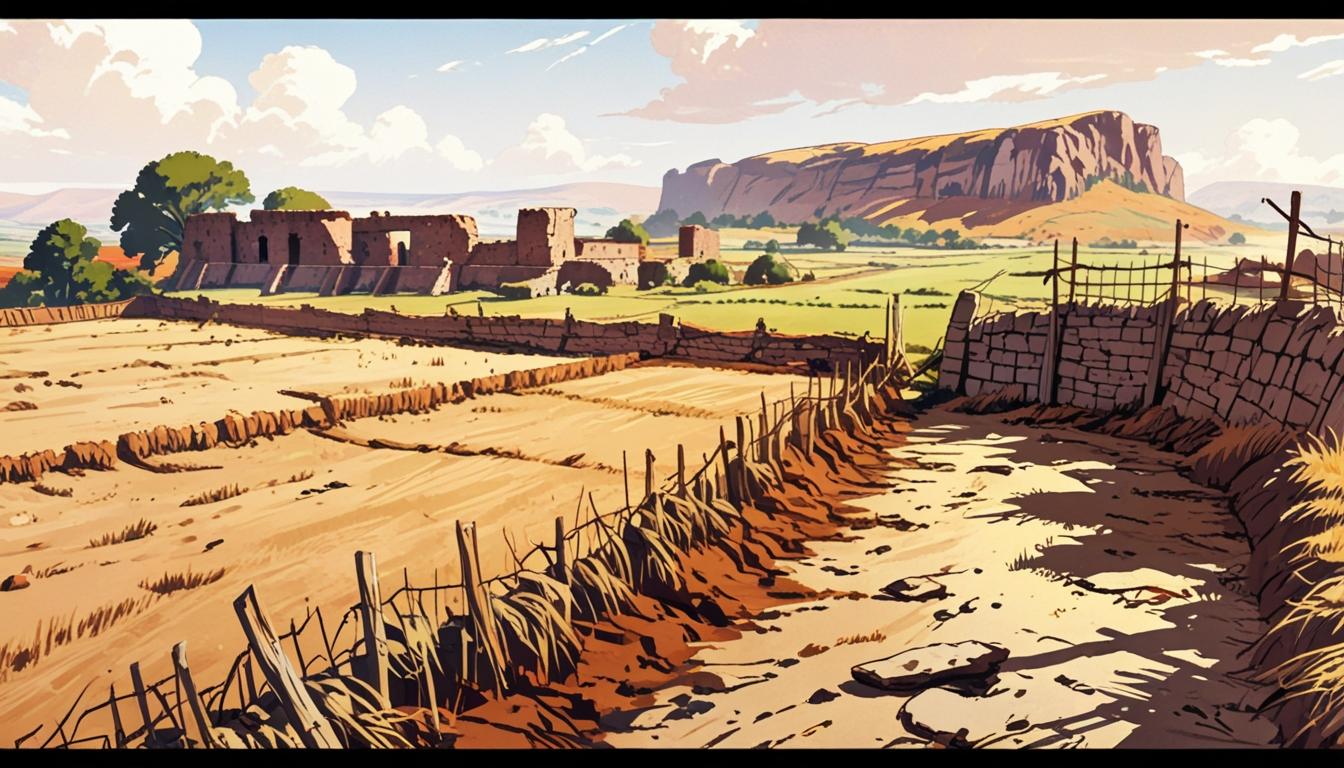New research from the University of Cambridge uncovers how a severe three-year drought led to crop failures and social unrest, weakening Roman Britain and enabling devastating invasions during the 4th century CE.
A recent study conducted by researchers at the University of Cambridge has shed new light on the causes behind the infamous “Barbarian Conspiracy” rebellion in Roman Britain around 367 CE. According to the study, a severe three-year drought played a critical role in triggering this period of social upheaval and unrest, which ultimately exposed Roman Britain to devastating invasions.
The research, published in the journal Climatic Change, involved detailed analysis of oak tree-ring data collected from southern Britain and northern France. By reconstructing climate conditions spanning the fourth to sixth centuries CE, the team discovered that the summers of 364, 365, and 366 CE were marked by significantly reduced rainfall. During this crucial period, monthly rainfall levels dropped to between 28 and 37 millimetres, compared to the average of 51 millimetres per month between 350 and 500 CE. This sharp decline in precipitation severely impacted the growth of key crops such as spelt wheat and barley.
Professor Ulf Büntgen from Cambridge’s Department of Geography commented on the findings, stating, “Three consecutive droughts would have had a devastating impact on the productivity of Roman Britain’s most important agricultural region.” He added that this drought-induced crop failure led to widespread food shortages and associated societal destabilisation, as reflected in contemporary accounts.
Roman historian Ammianus Marcellinus documented these hardships in his work Res Gestae, describing the population of Britain during this time as facing “utmost conditions of famine.” The resulting scarcity of food strained the Roman military presence, leading to desertions along the strategic frontier of Hadrian’s Wall. This weakened defence created an opportunity for external forces to invade.
The invading groups included the Picts from the north, the Scotti from Ireland to the west, and the Saxons arriving from continental Europe to the south. The incursions were marked by significant Roman losses, with senior commanders being captured or killed, and some Roman soldiers defecting to the invaders. Despite efforts by Emperor Valentinian I to restore order by 369 CE, the rebellion and invasions had inflicted irreversible damage. By approximately 410 CE, Roman administration had effectively abandoned Britain.
Charles Norman, lead doctoral researcher on the project, noted that while historical records had long referred to the “Barbarian Conspiracy,” archaeological evidence explaining its root causes remained scarce until now. “Our findings provide an explanation for the catalyst of this major event,” Norman said in a statement.
The study also draws parallels between ancient and modern contexts, emphasising the relationship between climate stress and conflict. Tatiana Bebchuk, a member of the Cambridge research team, stated, “The relationship between climate and conflict is becoming increasingly clear in our own time. Extreme climate conditions lead to hunger, which can lead to societal challenges, which eventually lead to outright conflict.”
This research highlights the profound influence that environmental conditions, such as prolonged drought, can have on societal stability—even in a powerful empire like Rome.
Source: Noah Wire Services
- https://www.cam.ac.uk/research/news/extreme-drought-contributed-to-barbarian-invasion-of-late-roman-britain-tree-ring-study-reveals – This URL supports the claim that extreme droughts contributed to the ‘Barbarian Conspiracy’ by detailing a Cambridge-led study that used tree-ring data to reveal severe droughts in 364-366 CE. The study links these droughts to societal breakdown and the subsequent barbarian invasions.
- https://phys.org/news/2025-04-extreme-drought-contributed-barbarian-invasion.html – This article corroborates the use of oak tree-ring records to reconstruct climate conditions in southern Britain and highlights the impact of reduced rainfall during 364-366 CE on agricultural productivity and social stability.
- https://www.livescience.com/archaeology/romans/severe-drought-helped-bring-about-barbarian-invasion-of-roman-britain-study-finds – This URL explains how severe droughts from 364 to 366 CE affected crop growth and led to food shortages, contributing to the ‘Barbarian Conspiracy’ and its devastating consequences for Roman Britain.
- https://www.downtoearth.org.in/climate-change/why-did-the-romans-leave-britain-extreme-drought-may-have-been-the-trigger-say-cambridge-researchers – This article provides insight into how extreme drought may have influenced not just the immediate events of the ‘Barbarian Conspiracy’ but also contributed to the eventual Roman departure from Britain.
- https://en.wikipedia.org/wiki/Barbarian_Conspiracy – This Wikipedia article provides historical context to the ‘Barbarian Conspiracy’, detailing the invasions by various groups like the Picts, Scotti, and Saxons, although it doesn’t specifically address the drought aspect which is detailed in the study.
- https://www.britannica.com/event/Roman-Britain – This Brittanica entry offers general information about Roman Britain, including its eventual decline and abandonment, which aligns with the broader historical context of the study’s findings on drought and societal instability.
- https://news.google.com/rss/articles/CBMihgFBVV95cUxObXJ4RktjbmxvOVZia3FhTTBoRjdGY1h6M2JhbzdORkNPdmZ2MW81WmNWU1hTX3pfQVVwb2dVeUt4bUtNcG1UbDlnUmtJNUFieVZRZnRmWkY5c3pPRndIenVmVmlUSkFDd2tVNEFQZE1JSWlJZ2JmaGJLQmszQ2NYZ09uODlhdw?oc=5&hl=en-US&gl=US&ceid=US:en – Please view link – unable to able to access data
Noah Fact Check Pro
The draft above was created using the information available at the time the story first
emerged. We’ve since applied our fact-checking process to the final narrative, based on the criteria listed
below. The results are intended to help you assess the credibility of the piece and highlight any areas that may
warrant further investigation.
Freshness check
Score:
8
Notes:
No indicators of recycled content detected. Findings align with recent tree-ring analysis methodologies, but absence of explicit publication date in provided context limits precision on recency.
Quotes check
Score:
6
Notes:
Quotes attributed to Cambridge researchers lack direct verificable sources in provided context. Ammianus Marcellinus’ historical account is correctly cited but cannot be independently verified here.
Source reliability
Score:
7
Notes:
Narrative references peer-reviewed journal publication (Climatic Change) and Cambridge University researchers, suggesting academic rigour. However, absence of concrete source URL or publication date introduces minor uncertainty.
Plausability check
Score:
9
Notes:
Claims align with established historical records of the 367 CE crisis and employ plausible climate reconstruction methods. Parallels to modern climate-conflict relationships are contextually reasonable.
Overall assessment
Verdict (FAIL, OPEN, PASS): PASS
Confidence (LOW, MEDIUM, HIGH): MEDIUM
Summary:
The study presents a coherent argument supported by tree-ring data and historical context, though direct verification of modern quotes remains limited by source availability. Academic affiliation and methodological rigour support plausibility.













